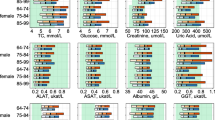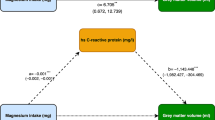Abstract
Background
Elderly people are exposed to an increased load of stressful events and neuro-hormonal stimulation is a key finding in metabolic syndrome and its related disorders.
Aims
To determine the role of cortisol in elderly subjects, with or without metabolic syndrome (MetS), by means of a national multicentre observational study, AGICO (AGIng and Cortisol).
Methods
From 2012 to 2017, the AGICO study enrolled n.339 subjects (aged > 65), after obtaining their informed consent. The investigators assessed a cardio-metabolic panel (including electrocardiogram, carotid ultrasonography and echocardiography), the presence of MetS (on Adult Treatment Panel III criteria), a neurological examination (including brain imaging), and cortisol activity (using a consecutive collection of diurnal and nocturnal urine).
Results
In the patients presenting with MetS, the standardized diurnal and nocturnal cortisol excretion rates were 210.7 ± 145.5 and 173.7 ± 118.1 (mean ± standard deviation) μg/g creatinine/12 h; in those without MetS, the standardized diurnal and nocturnal cortisol excretion rates were 188.7 ± 92.7 and 144.1 ± 82.3 μg/g creatinine/12 h, respectively (nocturnal urinary cortisol in patients with MetS versus those without MetS p = 0.05, female patients with MetS vs female patients without MetS, p < 0.025). A significant positive correlation was found between the CRP levels and both the diurnal and nocturnal urinary cortisol levels with r = 0.187 (p < 0.025) and r = 0.411 (p < 0.00000001), respectively.
Discussion
The elderly patients with MetS showed a trend towards increased standardized nocturnal cortisol excretions, with particular regard to the female subjects.
Conclusion
The positive correlation between cortisol excretion and low-grade inflammation suggests a common mechanism driving both hormonal and inflammatory changes.



Similar content being viewed by others
References
Comijs HC, van den Kommer TN, Minnaar RW et al (2011) Accumulated and differential effects of life events on cognitive decline in older persons: depending on depression, baseline cognition, or ApoE epsilon4 status? J Gerontol B Psychol Sci Soc Sci 66:i111–120
McEwen BS (2007) Physiology and neurobiology of stress and adaptation: central role of the brain. Physiol Rev 87:873–904
Alexopoulos N, Katritsis D, Raggi P (2014) Visceral adipose tissue as a source of inflammation and promoter of atherosclerosis. Atherosclerosis 233:104–112
Hotamisligil GS (2017) Inflammation, metaflammation and immunometabolic disorders. Nature 542:177–185
Chan KCA, Lit LCW, Law ELK et al (2004) Diminished urinary free cortisol excretion in patients with moderate and severe renal impairment. Clin Chem 50:757–759
Seeman TE, McEwen BS, Rowe JW (2001) Allostatic load as a marker of cumulative biological risk: MacArthur studies of successful aging. Proc Natl Acad Sci USA 98:4770–4775
Katz S, Ford AB, Moskowitz RW et al (1963) Studies of illness in the aged. The index of ADL: a standardized measure of biological and psychosocial function. JAMA 185:914–919
Lawton MP, Brody EM (1969) Assessment of older people: self-maintaining and instrumental activities of daily living. Gerontologist 9:179–186
Folstein MF, Folstein SE, McHugh PR (1975) “Mini-mental state”. A practical method for grading the cognitive state of patients for the clinician. J Psychiatr Res 12:189–198
Yesavage JA, Brink TL, Rose TL et al (1982) Development and validation of a geriatric depression screening scale: a preliminary report. J Psychiatr Res 17:37–49
Alexopoulos GS, Abrams RC, Young RC et al (1988) Cornell scale for depression in dementia. Biol Psychiatr 23:271–284
Linn BS, Linn MW, Gurel L (1968) Cumulative illness rating scale. J Am Geriatr Soc 16:622–626
Di Bari M, Balzi D, Roberts AT et al (2010) Prognostic stratification of older persons based on simple administrative data: development and validation of the “Silver Code”, to be used in emergency department triage. J Gerontol A Biol Sci Med Sci 65:159–164
National Health and Nutrition Examination Survey (NHANES) (2017) Anthropometry procedures manual. Center for Disease Control and Prevention (CDC). Washington, DC, pp 1–95
Third Report of the National Cholesterol Education Program (NCEP) Expert Panel on Detection, Evaluation, and Treatment of High Blood Cholesterol in Adults (Adult Treatment Panel III) (2001). NIH Publication n.012-3670, pp 1–40
Third Report of the National Cholesterol Education Program (NCEP) Expert Panel on Detection, Evaluation, and Treatment of High Blood Cholesterol in Adults (Adult Treatment Panel III) (2002). NIH Publication n.02-5215, pp 1–284
Van Cauter E, Leproult R, Kupfer DJ (1996) Effects of gender and age on the levels and circadian rhythmicity of plasma cortisol. J Clin Endocrinol Metab 81:2468–2473
Noale M, Maggi S, Limongi CMF et al (2006) Components of the metabolic syndrome and incidence of diabetes in elderly Italians: The Italian longitudinal study on aging. Atherosclerosis 187:385–392
Raffaitin C, Féart C, Le Goff M et al (2011) Metabolic syndrome and cognitive decline in French elders: the three-city study. Neurology 76:518–525
Seeman TE, McEwen BS, Singer BH et al (1997) Increase in urinary cortisol excretion and memory declines: MacArthur studies of successful aging. J Clin Endocrinol Metab 82:2458–2465
Francisco V, Ruiz-Fernández C, Pino J et al (2019) Adipokines: linking metabolic syndrome, the immune system, and arthritic diseases. Biochem Pharmacol 165:196–206
Veilleux A, Rhéaume C, Daris M et al (2009) Omental adipose tissue type 1 11-beta-hydroxysteroid dehydrogenase oxoreductase activity, body fat distribution, and metabolic alterations in women. J Clin Endocrinol Metab 94:3550–3557
Giordano A, Frontini A, Cinti S (2016) Convertible visceral fat as a therapeutic target to curb obesity. Nat Rev Drug Discov 15:405–424
Dhabhar FS (2009) Enhancing versus suppressive effects of stress on immune function: implications for immunoprotection and immunopathology. NeuroImmunoModulation 16:300–317
Martocchia A, Stefanelli M, Falaschi GM et al (2016) Recent advances in the role of cortisol and metabolic syndrome in age-related degenerative diseases. Aging Clin Exp Res 28:17–23
Author information
Authors and Affiliations
Consortia
Corresponding author
Ethics declarations
Conflict of interest
On behalf of all the authors, the corresponding author states that there is no conflict of interest.
Research involving human participants and/or animals
All the procedures carried out by this study involving human participants were performed in accordance with the ethical standards of the institutional and/or national research committee and with the 1964 Helsinki declaration and its later amendments or comparable ethical standards.
Informed consent
Informed consent was obtained from all the individual participants included in this study.
Additional information
Publisher's Note
Springer Nature remains neutral with regard to jurisdictional claims in published maps and institutional affiliations.
See Appendix for the AGICO Investigators.
Appendix
Appendix
AGICO Study Investigators
Paolo Falaschi, Antonio Martocchia, Manuela Stefanelli, Lavinia Toussan, Francesca Pastore, Stefano Eleuteri, Giulia Maria Falaschi (Geriatric Unit, S. Andrea Hospital, Sapienza University of Rome); Antonella Proietti, Rosaria D’Urso, Letizia Petricca, Patrizia Cardelli (Department of Clinical and Molecular Medicine, Laboratory Medicine Unit, S. Andrea Hospital, Sapienza University of Rome); Maurizio Gallucci, Maria Grazia Oddo (Cognitive Impairment Centre, Local Health Autority n.2 Marca Trevigiana, Treviso, Italy, Centro per i Disturbi Cognitivi e le Demenze, Azienda ULSS2 Marca Trevigiana); Stefania Maggi, Marianna Noale (National Research Council, Neuroscience Institute, Padova); Demetrio Postacchini, Cinzia Giuli, Ilenia Macchiati, Monica Migale, Francesca Sorvillo, Roberto Brunelli, Monia Francavilla, Silvia Santini (Geriatric Unit, Italian National Research Centre on Aging IRCCS-INRCA, Fermo, Italy); Luciano Marini, Elpidio Santillo, Luca Fallavollita (Geriatric-Rehabilitative Department, Italian National Research Centre on Aging IRCCS-INRCA, Fermo, Italy); Maurizio Cassol, Sara Rotunno (Internal Medicine Unit, S. Pietro Fatebenefratelli Hospital, Rome); Giuseppe Paolisso, Michelangela Barbieri, Edith Angellotti (Department of Advanced Medical and Surgical Sciences, University of Campania “L. Vanvitelli”, Naples); Claudio Ferri, Valeria Ludovici, Paola Cheli, Rita Del Pinto (Division of Internal Medicine & Nephrology, Cardiometabolic Prevention Unit and School of Internal Medicine, University of L’Aquila - San Salvatore Hospital); Giovambattista Desideri (University of L’Aquila); Mario Barbagallo, Ligia J. Dominguez, Giovanna Di Bella, Valentino Culotta (Geriatric Unit, Department of Internal Medicine and Geriatrics, University of Palermo).
Rights and permissions
About this article
Cite this article
Martocchia, A., Gallucci, M., Noale, M. et al. The cortisol burden in elderly subjects with metabolic syndrome and its association with low-grade inflammation. Aging Clin Exp Res 32, 1309–1315 (2020). https://doi.org/10.1007/s40520-019-01322-3
Received:
Accepted:
Published:
Issue Date:
DOI: https://doi.org/10.1007/s40520-019-01322-3




